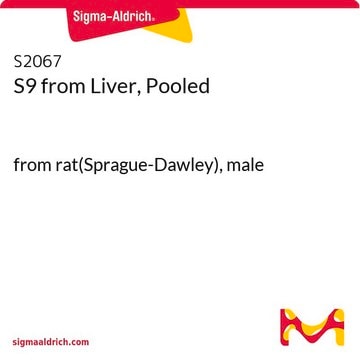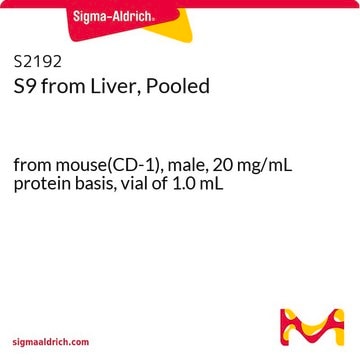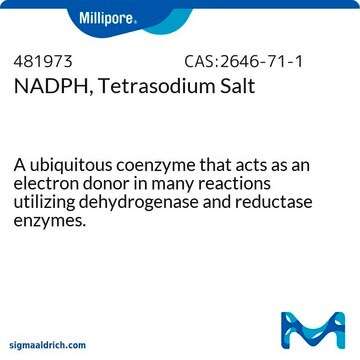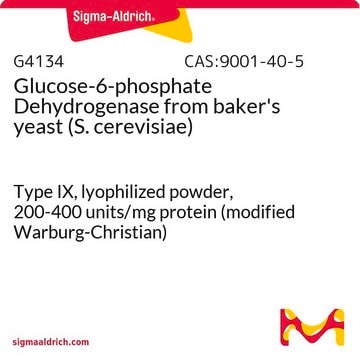S2442
S9 from Liver, Pooled
from human
Synonym(s):
Liver S9 Fraction, S9 Liver Extract
Sign Into View Organizational & Contract Pricing
All Photos(1)
About This Item
UNSPSC Code:
12161501
NACRES:
NA.47
Recommended Products
biological source
human
Quality Level
packaging
vial of ~20 mg
UniProt accession no.
shipped in
dry ice
storage temp.
−70°C
Gene Information
human ... RPS9(6203)
Looking for similar products? Visit Product Comparison Guide
Application
Pooled S9 fractions from liver have been used for genotoxicity experiments.
Biochem/physiol Actions
The hepatic S9 pools from a variety of biological sources represent the post-mitochondrial supernatant fraction from homogenized liver. Known to be a rich source of drug metabolizing enzymes including P-450, these pools are useful in the study of xenobiotic metabolism and drug interactions.
The hepatic S9 pools from a variety of biological sources represent the post-mitochondrial supernatant fraction from homogenized liver. They are known to be a rich source of drug metabolizing enzymes including P-450. S9 pools are useful in the study of xenobiotic metabolism and drug interactions. They are used in the Ames test, which is a method that uses bacteria to test if a given chemical causes mutations in the genetic material of a given test organism.
Storage Class Code
10 - Combustible liquids
WGK
WGK 2
Flash Point(F)
Not applicable
Flash Point(C)
Not applicable
Personal Protective Equipment
dust mask type N95 (US), Eyeshields, Gloves
Choose from one of the most recent versions:
Already Own This Product?
Find documentation for the products that you have recently purchased in the Document Library.
Customers Also Viewed
A conjugate of pyridine-4-aldoxime and atropine as a potential
antidote against organophosphorus compounds poisoning
antidote against organophosphorus compounds poisoning
Jasna Lovric
Acta Biochimica Polonica, 58(2) (2011)
Marina Paul et al.
Reproductive sciences (Thousand Oaks, Calif.) (2023-02-11)
The mechanism by which human labor is initiated in the presence of elevated circulating progesterone levels remains unknown. Recent evidence indicates that the progesterone-metabolizing enzyme, 20α-hydroxysteroid dehydrogenase (20α-HSD), encoded by the gene AKR1C1, may contribute to functional progesterone withdrawal. We
Implementation of the Three Rs in the Human Hazard
Assessment of Brazilian Medicinal Plants: An Evaluation
of the Cytotoxic and Genotoxic Potentials of Dipteryx
alata Vogel
Assessment of Brazilian Medicinal Plants: An Evaluation
of the Cytotoxic and Genotoxic Potentials of Dipteryx
alata Vogel
Natalia M. Esteves-Pedro
Alberta RN / Alberta Association of Registered Nurses (2011)
The Ames Salmonella/microsome mutagenicity assay.
Mortelmans K and Zeiger E
Mutation Research (2000)
An improvement of the Ames test using a modified human liver S9 preparation.
Hakura A
Journal of Pharmacological and Toxicological Methods, 169-172 (2001)
Our team of scientists has experience in all areas of research including Life Science, Material Science, Chemical Synthesis, Chromatography, Analytical and many others.
Contact Technical Service











